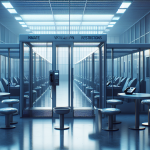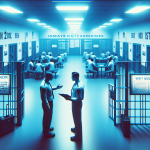Correctional Industrial Facility – Overview and Information
Correctional industrial facilities are an integral component of state correctional systems, providing inmates with meaningful work training programs in order to rehabilitee and eventually reenter the workforce. Correctional industrial facilities, also known as “correctional industries”, are onsite correctional facilities in which inmates work to manufacture goods and products. These facilities provide inmates with job training skills, offer them productive organized labor activities, and help inmates become productive members of society upon release.
Corrections industrial facilities offer a variety of services and opportunities for inmates. Inmates are typically trained in different industrial occupations including metalwork, woodwork, automotive repair, welding, and machine operation. They are also given access to educational programs which provide classes in basic language, mathematics, communication, and career development. Additionally, the facilities provide inmates with the opportunity to work on projects such as furniture, fences, gates, and landscape designs.
In order to promote successful completion of their correctional industrial facility programs, inmates must meet certain requirements such as showing good behavior, maintaining decent grades, and completing extra duties and projects. In addition, every facility has its own safety regulations which require inmates to wear protective gear such as safety goggles and gloves during their work. Additional safety protocols are usually implemented to ensure that the prison staff is protected.
Retraining inmates to successfully reenter the workforce is an important part of reducing crime and recidivism rates. Correctional industrial facilities provide inmates with the skills, training, and employment opportunities to help them reintegrate into society. Inmates are also encouraged to take part in other programs such as substance abuse counseling and vocational training so that they can lead productive post-prison lives.
Correctional Industrial Facility – Classes, Services, and Programs
A Correctional Industrial Facility (CIF) is a correctional facility that specializes in providing vocational training and industrial work programs for prisoners. The goal of the CIF is to provide inmates with education and experience preparing them for reintegration into society when they are released.
CIFs offer a variety of classes, services and programs designed to support the rehabilitation of inmates. Education classes offered may include basic literacy and numeracy, GED preparation and life skills. Academic degrees offered may range from community college courses to college degrees in specific areas such as business administration, construction management or computer technology.
In addition to education, inmates may receive vocational training in a variety of trades such as carpentry, auto mechanics, electrical, welding, machinist, culinary arts, catering services, landscaping, welding, plumbing and barbering. These courses help inmates acquire skills that they can use when released to find jobs and support themselves. Moreover, inmates generally receive certificates or diplomas upon completion of these courses.
Services and programs also aim to provide inmates with necessary resources. Health services may be provided to address inmates’ physical and mental health needs. Drug and alcohol counseling, anger management and religious services may be other resources available.
Moreover, CIFs usually host on-site plant and garden operations to teach inmates about gardening and horticulture. Criminology classes, in which inmates learn the theories of criminal behavior, may also be offered.
Above all, the goal of the CIF is to provide inmates with the resources and education they need to successfully reintegrate into society and live successful, productive lives.
Inmate visiting application in Correctional Industrial Facility
Inmate visiting application in Correctional Industrial Facility is a process where friends or family members of an inmate can apply for a visit to an offender residing in a Correctional Industrial Facility (CIF). The CIF is a state-run prison that provides inmates with education and vocational training and is designed to help them transition into successful members of society following their release from incarceration.
The process for visiting an inmate in a Correctional Industrial Facility starts with submitting a visitor application to the correctional facility. Different states have different requirements for the visitor application, so it is important to do some research to determine the specific steps involved.
The submitted application will include certain information such as the proposed visitor’s name, date of birth, address, and phone number. Criminal history and history of CIF orders will also need to be indicated. In addition, a valid government-issued photo ID is required.
After the inmate application has been submitted, the facility will determine whether it has been accepted and what times and conditions an approved visitor may have. Visitor policies may include the number of visitors allowed, the maximum frequency of visits, and whether phones and cameras are allowed. Additionally, visitors must provide valid government-issued photo identification to enter the facility and may undergo a pat down upon search.
Once approved, the visit is scheduled and the visitor will be provided with information on how to enter the facility. The visit will take place in a designated area, and the inmate will be securely searched prior to being allowed to meet with the visitor. Correctional Industrial Facilities officers will monitor all inmate-visitor interactions.
Visiting an inmate in a Correctional Industrial Facility can be less complicated than visits to other facilities. However, following all rules and regulations and providing all necessary paperwork in a timely manner is essential to ensure a successful visit.
Correctional Industrial Facility: Frequently Asked Questions and Answers
Correctional Industrial Facility: Frequently Asked Questions and Answers
1. What is a Correctional Industrial Facility?
A Correctional Industrial Facility (CIF) is a minimum to maximum security subject to the oversight of an adult correctional institution, which provides a variety of industry, services, and programs to assist incarcerated persons in their development. Industries include the production of furniture, clothing and textiles, automotive parts, electronics, and building materials.
2. What are the goals of a Correctional Industrial Facility?
The main goal of a CIF is to provide inmates with the opportunity to participate in meaningful work activities which will help them gain new skills, develop successful work habits, and achieve a sense of pride in doing a job well. By giving inmates the opportunity to participate in meaningful work, the CIF also helps them develop a sense of responsibility which can help them when they are released.
3. Are there educational opportunities available at a Correctional Industrial Facility?
Yes, inmates may also have the opportunity to participate in educational and vocational training during their stay in the CIF. The training may include courses in basic literacy, vocational training in a specific trade, and educational courses such as GED preparation courses and some college courses.
4. Are inmates allowed to earn money while in a Correctional Industrial Facility?
Yes, inmates may earn money at the CIF through incentives such as wages, bonuses, and workplacement in other industries. Some industries may even provide the opportunity for additional education and skills development which may be beneficial upon release.
5. What safety measures are taken to ensure the safety of inmates in a Correctional Industrial Facility?
The CIF takes several measures to ensure the safety of inmates in the facility. Security guards are present to continuously patrol the premises, and inmates are required to wear orange uniforms which make them easily identifiable. The CIF also has strong, secure boundaries and well-staffed watch towers.






